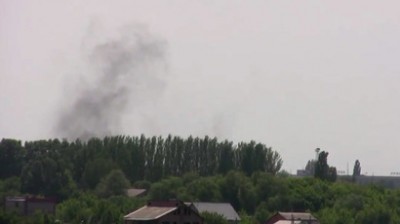Global Hegemony in the Guise of “Collective Defense” against Russia. Moscow’s Response?

Chief among the stated reasons the United States has decided to arbitrate the future of Ukraine for its citizens, is the grave danger Russia allegedly poses not only to Kiev, but to Europe and the rest of the world. This despite the fact that it was the US which facilitated violent protests that eventually overthrew the elected government of Ukraine in 2013-2014 in the first place, leading directly to the war now unfolding in the heart of Eastern Europe.
It was not long ago that another ambitious power cited Russia as a threat and invoked “collective defense” to justify what would become a contest between nations leaving tens of millions dead and entire countries in ruins. Nazi Germany’s leader, Adolf Hitler would claim regarding his decision to invade Russia that:
The purpose of this front is no longer the protection of the individual nations, but rather the safety of Europe, and therefore the salvation of everyone.
I have therefore decided today once again to put the fate of Germany and the future of the German Reich and our people in the hands of our soldiers.
Sounding eerily familiar are US and NATO justifications for their continued expansion east and escalations made against Russia today. And also like that other ambitious power, the United States has waged wars all across the planet, far from Russia’s borders and with little to do with Russia’s interests beyond its borders, long before it turned its sights on Moscow.
Since World War II, the United States has invaded, bombed, and/or occupied the Korean Peninsula, Vietnam, Cambodia, Laos, Somalia, Lebanon, Yugoslavia, Iraq, Afghanistan, Libya, and Syria. Some of these nations have been attacked by the US more than once. In many more countries the US has facilitated the violent overthrow of various governments, particularly in South America and the Middle East, first through the use of its Central Intelligence Agency (CIA), then through more veiled organizations like the National Endowment for Democracy (NED). It has troops stationed in over a hundred nations around the world, occupying hundreds of military installations.
Its NATO alliance openly seeks to expand. A look at the map of NATO expansion over the past several decades after its creation shows it clearly encroaching upon and encircling Russia – violently overthrowing many of the nations along Russia’s borders with backed uprisings like those seen most recently in Ukraine. In fact, the previous uprising in Ukraine, the “Orange Revolution,” was admittedly the work of the US. The Guardian would admit in its 2004 article, “US campaign behind the turmoil in Kiev,” that:
…while the gains of the orange-bedecked “chestnut revolution” are Ukraine’s, the campaign is an American creation, a sophisticated and brilliantly conceived exercise in western branding and mass marketing that, in four countries in four years, has been used to try to salvage rigged elections and topple unsavoury regimes.
Funded and organised by the US government, deploying US consultancies, pollsters, diplomats, the two big American parties and US non-government organisations, the campaign was first used in Europe in Belgrade in 2000 to beat Slobodan Milosevic at the ballot box.
More recently, the US State Department’s Victoria Nuland was recorded talking with the US Ambassador to Ukraine, literally handpicking the regime that would take the place of the government they helped overthrow. Just recently, the New York Times admits that the West is intentionally rigging global oil prices to undermine Russia. Such provocations are not the work of nations seeking peace or to deescalate tensions, but insidious provocations meant to continue to goad perceived enemies into reacting so as to then disingenuously cite additional “threats” that require additional “collective defense.” And so, over the cliff such interests lead the entire Western World.
This is Called “Imperialism”
Historically, a nation maintaining such a posture is known as an “imperialist.” Imperialists maintain a variety of tricks to make their aspirations for global hegemony appear as a series of reluctant moves made in its own defense, or the defense of others.
Not surprisingly, Russia has instead decided to defend itself.
Historians would remind the people of present the final outcome of Adolf Hitler’s use of “collective defense” to invade its neighbor to the east. The war would cost tens of millions their lives and Germany itself would be decimated and divided for decades afterward, undertaking a painful process of reconstruction, reconciliation, and retribution for the crimes it had committed against humanity.
For the German people themselves, they paid the highest price for the crimes of but a handful of special interests. Some of those special interests, particularly the Nazi Party, were liquidated entirely. Others, including bankers and industrialists who empowered and enriched themselves during the rule of the Nazis – including many American companies – escaped with absolute impunity and are to this day profiteering from new wars they tacitly support from the background through “think tanks” they fund producing policy papers that eventually transform into bills, declarations of war, and talking points featured on the nightly news.
History needs not repeat itself. People can just as easily reject arguments made for “collective defense” as such arguments are made. NATO will not fight a war without soldiers. Already in its proxy war with Russia in Ukraine, it has found few willing to subject themselves as pawns in this game. Ukrainians are ironically seeking shelter in Russia, not from “Kremlin backed rebels,” but from recruiters in Kiev seeking more young men to feed into a war of aggression precipitated by foreign interests. By simply spreading the word the trenches are dug that tangle the treads of this machine as it creeps forward.
Tony Cartalucci, Bangkok-based geopolitical researcher and writer, especially for the online magazine “New Eastern Outlook”.

